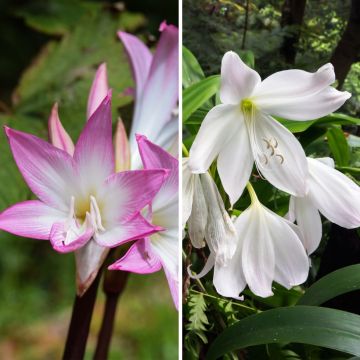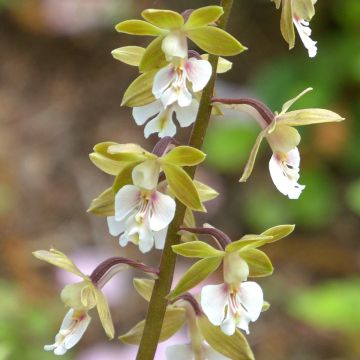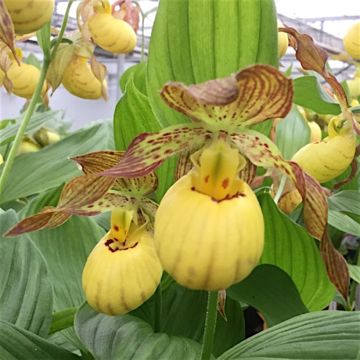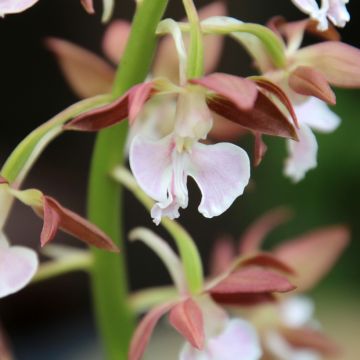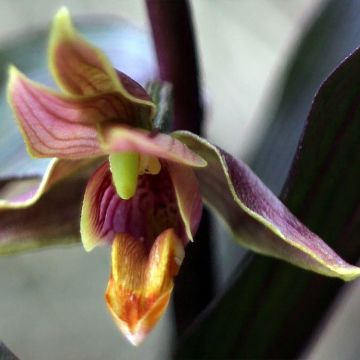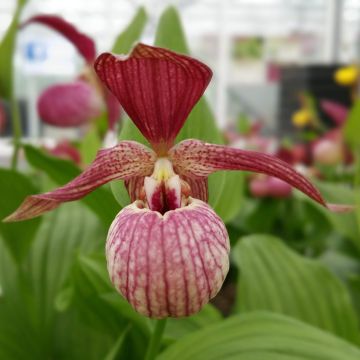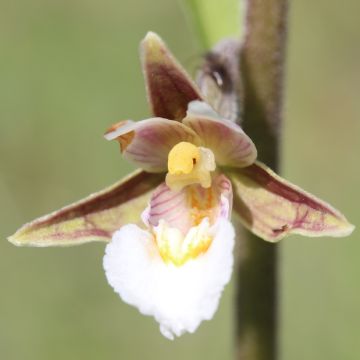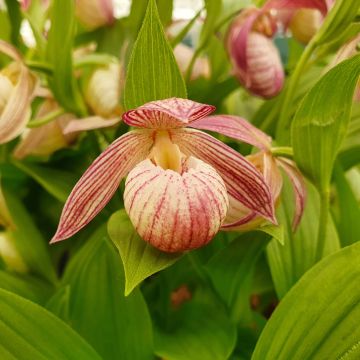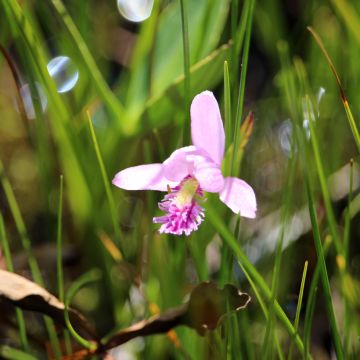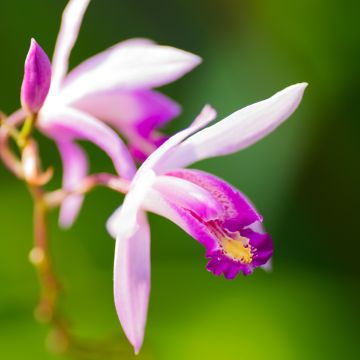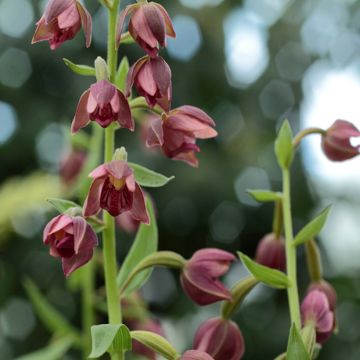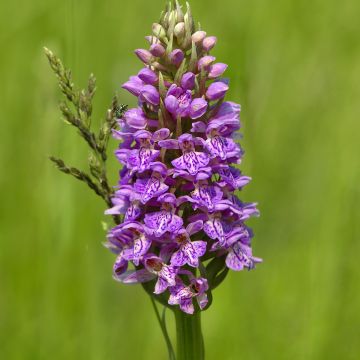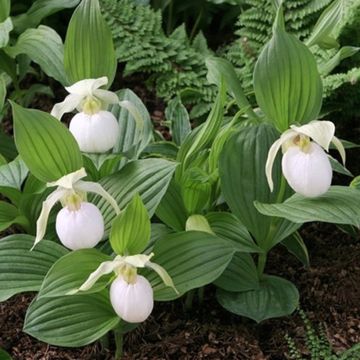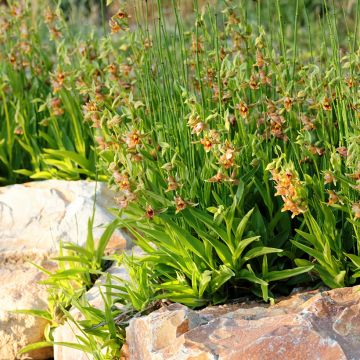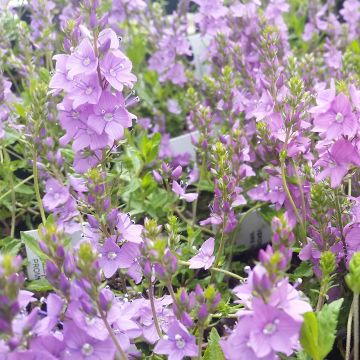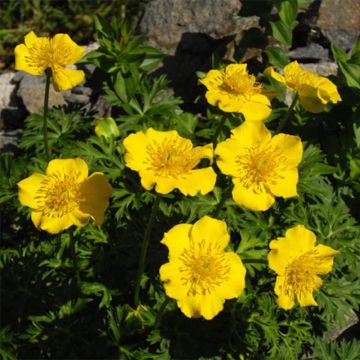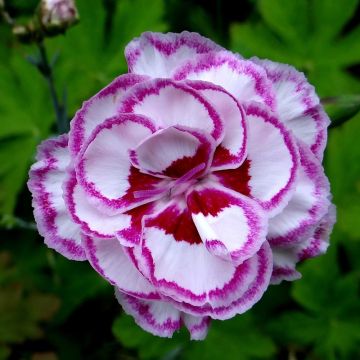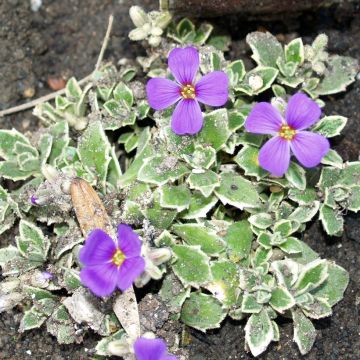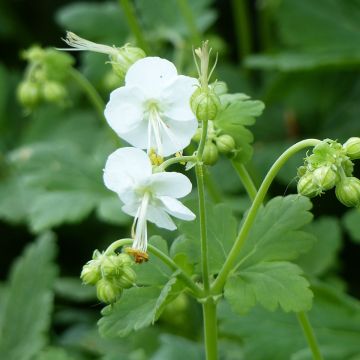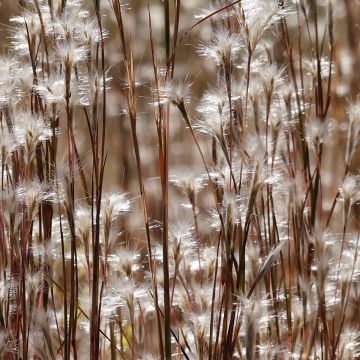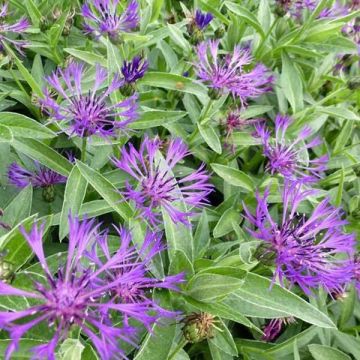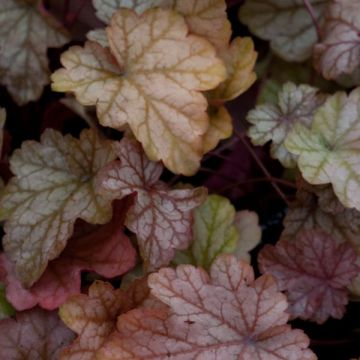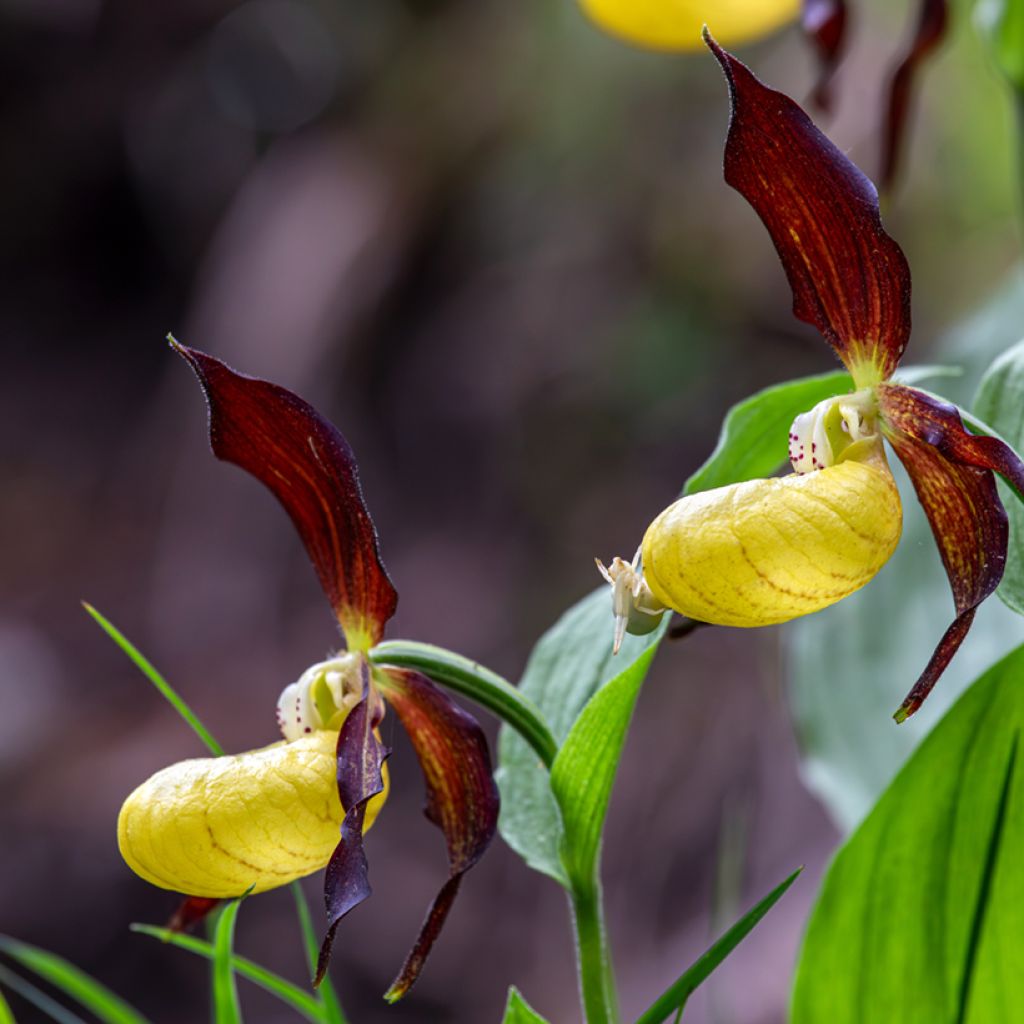

Cypripedium Emil
Cypripedium Emil
Cypripedium calceolus (x) parviflorum Emil
Yellow Lady's Slipper, Moccasin Flower
Why not try an alternative variety in stock?
View all →This plant carries a 12 months recovery warranty
More information
We guarantee the quality of our plants for a full growing cycle, and will replace at our expense any plant that fails to recover under normal climatic and planting conditions.
From €5.90 for pickup delivery and €6.90 for home delivery
Express home delivery from €8.90.
Does this plant fit my garden?
Set up your Plantfit profile →
Description
Cypripedium 'Emil' is a hybrid resulting from the cross-breeding of two Lady's Slipper Orchids, terrestrial orchids native to Europe and North America. Easier to cultivate than its parents, this variety is particularly attractive due to its enchanting flowers. In late spring, large flowers appear, consisting of dark, deep red-purple sepals which strongly contrast with the swollen, bright yellow lower lip. The bright light green foliage offers a perfect complementary colour to the remarkably patterned flowers. This very hardy plant thrives in cool temperate climates, in neutral to slightly alkaline, moist and well-drained soil, and in a sun-protected location.
Cypripedium is one of the 850 genera in the Orchidaceae family, the second largest in terms of species after the Asteraceae (formerly Compositae) family. Extremely diverse, represented in almost all natural environments, except deserts and bodies of water, the family includes both epiphytic species (using trees as support) and terrestrial species. While 95% of the species are tropical and subtropical, a few thousand are native to temperate countries.
Developed by German breeder Werner Frosch and introduced to the market in 1993, 'Emil' was named in honour of Emil Lueckel, a German botanist and former president of the German Orchid Society. This variety is the result of crossing the Cypripedium calceolus, Lady's Slipper Orchid from Europe, mainly found in the Alps in France (and less frequently in other mountain ranges), and the C. parviflorum, a species from North America that grows in moist forests with rich soils.
'Emil' is a deciduous orchid, which grows from a perennial sucker, spreading each year to form a clump. A well-developed plant, in humus-bearing, rich, moist, and well-drained soil, can produce up to 24 flowers within 3 to 4 years. The leaves emerge between April and May and are wide, long and elliptical, a beautiful bright light green with a silver-green underside and visible parallel longitudinal veins. The leaves are sheathing at the base and alternate on the stems, which measure approximately 35 to 45 cm in height. From mid-May, depending on the region, the famous Lady's Slipper flowers appear, composed of three sepals and three petals, with the lower one called the lip. The petals and sepals of this variety are reddish-purple, except for the lip, which is yellow. The two lateral petals are narrow and very long, curiously twisted like a corkscrew. The lip, on the other hand, forms a kind of large oval pouch, resembling a comfortable slipper. With a bright yellow colour, marked with discreet purple veins, it contrasts both in shape and colour with the other floral parts. Measuring about 10 cm in width, the flowers have an irresistible beauty, and their incredible pattern captures attention in the garden. The flowering period lasts for a month, sometimes more, providing a strong focal point of interest, especially when the clump has developed and bears numerous flowers.
Cypripedium 'Emil' is easier to cultivate than its parents, but still requires special attention. The secret to its success is to find a good location, in partial shade, protected from strong sunlight, in humus-bearing soil that remains moist throughout the year, especially in summer, while also being well-drained. It doesn't mind the cold but quickly deteriorates in dry conditions. You can plant it alongside Columbines (Aquilegia) and other flowers with sophisticated patterns in a wide range of colours. To extend the flowering period of your scene, plant a Bergenia 'Dragonfly Angel Kiss', whose small pale pink flowers will bloom in April-May on glossy dark green foliage. The beautiful Hart's Tongue Fern (Asplenium scolopendrium) will also be good company, with its long "deer tongue" leaves of bright green. And for winter flowers, a clump of Helleborus niger 'Maximus' will be perfect with its white corollas from December to March.
Report an error about the product description
Flowering
Foliage
Plant habit
Botanical data
Cypripedium
calceolus (x) parviflorum
Emil
Orchidaceae
Yellow Lady's Slipper, Moccasin Flower
Cultivar or hybrid
Other Garden Orchids
Planting and care
Plant Cypripedium 'Emil' in morning sun or partial shade, in a humus-rich, well-drained soil, on or between limestone rocks. This terrestrial orchid does not tolerate heavy (clay) and waterlogged soils, heatwaves or drought. It is easier to grow in cold alpine climates in winter, cool and slightly humid in summer. In nature, its roots are mycorrhizal with symbiotic fungi naturally present in the litter layer. Add 1/3 perlite or lava rock and 1/3 fine gravel to your topsoil when planting. Water the plant moderately, making sure to keep the soil slightly moist in summer. Protect the crown in the first year with a 10cm thick layer of dead leaves.
Planting period
Intended location
Care
This item has not been reviewed yet - be the first to leave a review about it.
Spring flowering perennials
Haven't found what you were looking for?
Hardiness is the lowest winter temperature a plant can endure without suffering serious damage or even dying. However, hardiness is affected by location (a sheltered area, such as a patio), protection (winter cover) and soil type (hardiness is improved by well-drained soil).

Photo Sharing Terms & Conditions
In order to encourage gardeners to interact and share their experiences, Promesse de fleurs offers various media enabling content to be uploaded onto its Site - in particular via the ‘Photo sharing’ module.
The User agrees to refrain from:
- Posting any content that is illegal, prejudicial, insulting, racist, inciteful to hatred, revisionist, contrary to public decency, that infringes on privacy or on the privacy rights of third parties, in particular the publicity rights of persons and goods, intellectual property rights, or the right to privacy.
- Submitting content on behalf of a third party;
- Impersonate the identity of a third party and/or publish any personal information about a third party;
In general, the User undertakes to refrain from any unethical behaviour.
All Content (in particular text, comments, files, images, photos, videos, creative works, etc.), which may be subject to property or intellectual property rights, image or other private rights, shall remain the property of the User, subject to the limited rights granted by the terms of the licence granted by Promesse de fleurs as stated below. Users are at liberty to publish or not to publish such Content on the Site, notably via the ‘Photo Sharing’ facility, and accept that this Content shall be made public and freely accessible, notably on the Internet.
Users further acknowledge, undertake to have ,and guarantee that they hold all necessary rights and permissions to publish such material on the Site, in particular with regard to the legislation in force pertaining to any privacy, property, intellectual property, image, or contractual rights, or rights of any other nature. By publishing such Content on the Site, Users acknowledge accepting full liability as publishers of the Content within the meaning of the law, and grant Promesse de fleurs, free of charge, an inclusive, worldwide licence for the said Content for the entire duration of its publication, including all reproduction, representation, up/downloading, displaying, performing, transmission, and storage rights.
Users also grant permission for their name to be linked to the Content and accept that this link may not always be made available.
By engaging in posting material, Users consent to their Content becoming automatically accessible on the Internet, in particular on other sites and/or blogs and/or web pages of the Promesse de fleurs site, including in particular social pages and the Promesse de fleurs catalogue.
Users may secure the removal of entrusted content free of charge by issuing a simple request via our contact form.
The flowering period indicated on our website applies to countries and regions located in USDA zone 8 (France, the United Kingdom, Ireland, the Netherlands, etc.)
It will vary according to where you live:
- In zones 9 to 10 (Italy, Spain, Greece, etc.), flowering will occur about 2 to 4 weeks earlier.
- In zones 6 to 7 (Germany, Poland, Slovenia, and lower mountainous regions), flowering will be delayed by 2 to 3 weeks.
- In zone 5 (Central Europe, Scandinavia), blooming will be delayed by 3 to 5 weeks.
In temperate climates, pruning of spring-flowering shrubs (forsythia, spireas, etc.) should be done just after flowering.
Pruning of summer-flowering shrubs (Indian Lilac, Perovskia, etc.) can be done in winter or spring.
In cold regions as well as with frost-sensitive plants, avoid pruning too early when severe frosts may still occur.
The planting period indicated on our website applies to countries and regions located in USDA zone 8 (France, United Kingdom, Ireland, Netherlands).
It will vary according to where you live:
- In Mediterranean zones (Marseille, Madrid, Milan, etc.), autumn and winter are the best planting periods.
- In continental zones (Strasbourg, Munich, Vienna, etc.), delay planting by 2 to 3 weeks in spring and bring it forward by 2 to 4 weeks in autumn.
- In mountainous regions (the Alps, Pyrenees, Carpathians, etc.), it is best to plant in late spring (May-June) or late summer (August-September).
The harvesting period indicated on our website applies to countries and regions in USDA zone 8 (France, England, Ireland, the Netherlands).
In colder areas (Scandinavia, Poland, Austria...) fruit and vegetable harvests are likely to be delayed by 3-4 weeks.
In warmer areas (Italy, Spain, Greece, etc.), harvesting will probably take place earlier, depending on weather conditions.
The sowing periods indicated on our website apply to countries and regions within USDA Zone 8 (France, UK, Ireland, Netherlands).
In colder areas (Scandinavia, Poland, Austria...), delay any outdoor sowing by 3-4 weeks, or sow under glass.
In warmer climes (Italy, Spain, Greece, etc.), bring outdoor sowing forward by a few weeks.

































